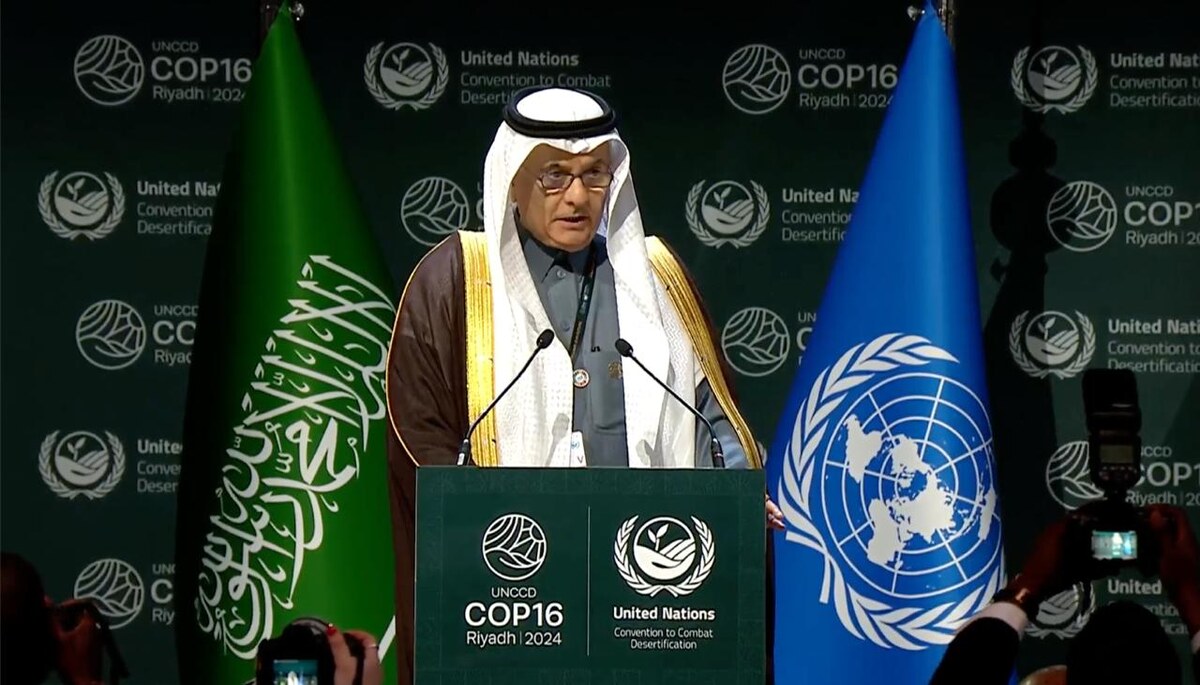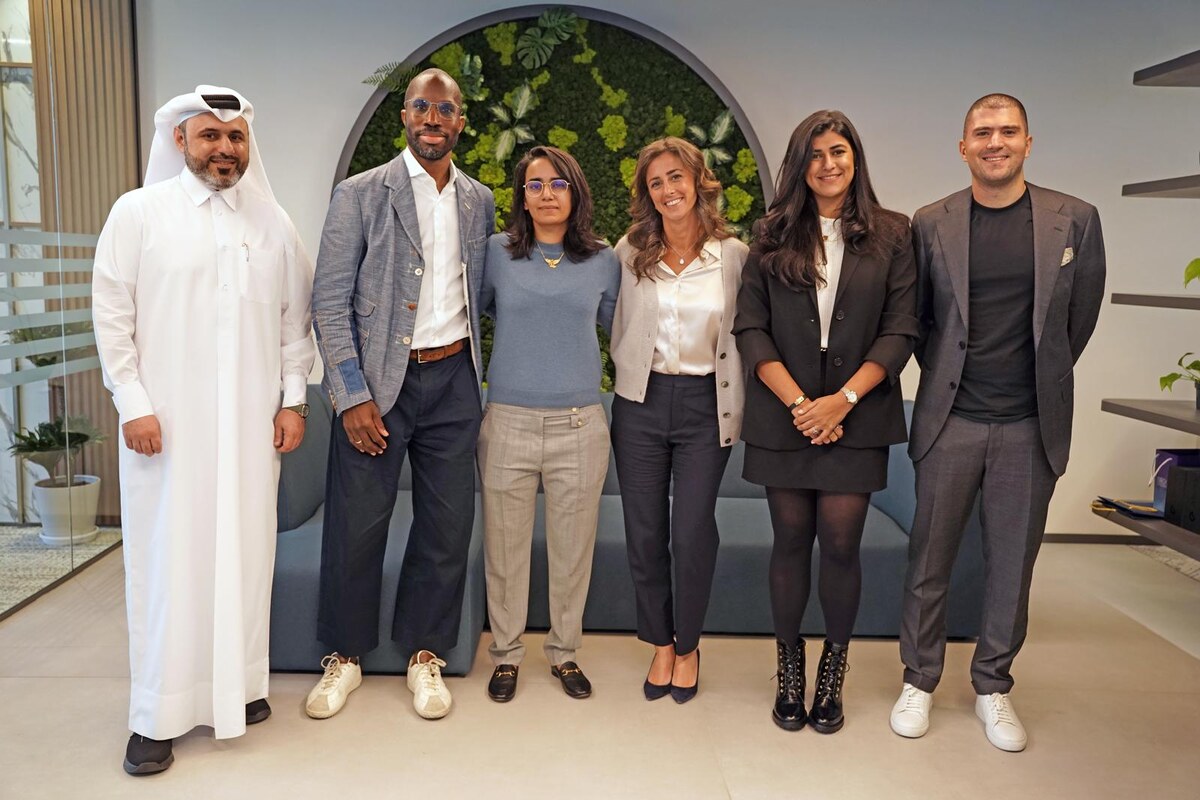RIYADH: COP16 witnessed unprecedented financial pledges totaling over $12 billion for land restoration and drought resilience initiatives, with Saudi Arabia leading from the front.
Held in Riyadh from December 2-13 under the theme “Our Land. Our Future,” COP16 brought together over 196 countries and numerous international organizations, marking a crucial milestone in the fight against environmental challenges that threaten billions of people worldwide.
Funding pledges seen at the event included £10 billion from the Arab Coordination Group to finance global projects combating land degradation, desertification, and drought.
Additional contributions included $1 billion each from the OPEC Fund and the Islamic Development Bank, and $150 million from Saudi Arabia.
A legacy of action and collaboration
Saudi Minister of Environment and COP16 President Abdulrahman Al-Fadhley opened the conference with a call for intensified international collaboration to combat desertification, particularly in regions most affected by climate change.
“The Middle East, among the regions most impacted by these challenges, stands ready to lead through collaboration and innovation,” Al-Fadhley stated.
He emphasized Saudi Arabia’s Vision 2030 as a cornerstone of the Kingdom’s green agenda.
This vision aims to restore 40 million hectares of degraded land, increase national reserves by 30 percent, and achieve a renewable energy mix of 50 percent by 2030.
The Saudi Green Initiative, launched in 2021, has already led to the planting of 95 million trees and the restoration of 111,000 hectares of land. The Kingdom announced five new projects valued at $60 million to ramp up climate and environmental efforts as part of the SGI.
Outgoing COP15 President Alain-Richard Donwahi of Côte d’Ivoire handed over leadership with a message of urgency, while UNCCD Executive Secretary Ibrahim Thiaw underscored that nearly 40 percent of the Earth’s land is degraded, impacting over 3 billion people.
He warned that failing to address land degradation could lead to intensified food insecurity, conflict, and forced migration.
At the Riyadh conference, the UN Convention to Combat Desertification estimated a need for at least $2.6 trillion in investments by 2030 to restore over 1 billion hectares of degraded land and enhance drought resilience. This translates to $1 billion in daily investments until 2030 to achieve global land restoration goals and combat desertification and drought.
The International Drought Resilience Observatory, which debuted its prototype at COP16, is set to be the world’s first AI-driven platform designed to help countries evaluate and improve their capacity to withstand severe droughts.
This cutting-edge tool is an initiative of the International Drought Resilience Alliance, which recently welcomed Saudi Arabia as a member.

Saudi Minister of Environment and COP16 President Abdulrahman Al-Fadhley. Screenshot
The Riyadh Policy Declaration
A major outcome of COP16 was the adoption of the Riyadh Policy Declaration, a document drafted by the newly formed Friends of the Chair group.
This declaration provides a comprehensive framework for global land restoration, drought resilience, and sustainable land management. The initiative showcases Saudi Arabia’s dedication to fostering international cooperation and achieving tangible results in the fight against desertification.
The Kingdom’s Deputy Minister for Environment, Osama Faqeeha, highlighted the significance of this collaborative effort, saying: “The Friends of the Chair group ensures that the outcomes of COP16 are not just promises but actionable steps toward global sustainability”.
Faqeeha also underscored the urgent need for private sector investment to bridge the estimated $355 billion annual funding gap for global land restoration.
“The restoration economy has the potential to unlock trillions in economic benefits, but it requires the commitment of all sectors,” Faqeeha stated.
Minister of Investment Khalid Al-Falih announced three major renewable energy projects developed in collaboration with French firms, emphasizing the Kingdom’s growing influence in the global green finance market.
“The future of finance is green, and Saudi Arabia is positioning itself as the global hub for sustainable investments,” Al-Falih said.
Innovative projects and sustainability initiatives
Saudi Arabia highlighted several transformative projects aimed at balancing economic growth with environmental preservation.
The National Red Sea Sustainability Strategy is a flagship initiative to protect 30 percent of the Red Sea’s marine and coastal ecosystems by 2030. This strategy is expected to contribute SR33 billion ($8.78 billion) annually to the economy and create 120,000 jobs.
John Pagano, CEO of Red Sea Global, emphasized the project’s commitment to regenerative tourism and renewable energy. “We are planting 50 million mangrove trees and expanding coral reef protection, aligning with our vision of sustainable development,” Pagano said.
In a landmark announcement, King Abdullah University of Science and Technology launched the International Water Research Center to address global water scarcity and pollution challenges.
The center will develop innovative water solutions in collaboration with the Ministry of Environment, Water, and Agriculture.
Saudi climate envoy Adel Al-Jubeir highlighted the link between land degradation and forced migration, noting that 100 million hectares of land are lost annually, exacerbating displacement and security crises.
“When people cannot grow food, they migrate, leading to tension and conflict,” Al-Jubeir warned. The UNCCD’s Thiaw echoed these concerns, emphasizing that land restoration is crucial for global stability and security.
The Great Green Wall, an African-led initiative was launched with an aim to restore 100 million hectares of degraded land, secured €11 million from the Italian government for landscape restoration in the Sahel, along with €3.6 million from the Austrian government to enhance coordination and implementation efforts across 22 African nations. This funding supports the GGW Accelerator, a UNCCD-backed initiative to create a greener and more prosperous Sahel.
Furthermore, the US, alongside partner countries and organizations, pledged nearly $70 million in investments to advance the Vision for Adapted Crops and Soils. This initiative aims to develop resilient food systems by promoting diverse, nutritious, and climate-adapted crops cultivated in healthy soils.
Thematic days and key dialogues
COP16 featured several thematic days addressing critical issues like sustainable agri-food systems, drought resilience, and rangeland protection, attracting more than 20,000 participants, with around 3,500 from civil society.
Agri-Food System Day coincided with World Soil Day, highlighting that unsustainable farming practices could lead to a 10 percent decline in global crop yields by 2050.
Faqeeha called for redirecting harmful agricultural subsidies toward sustainable practices to prevent further degradation.
Youth and technology were at the forefront of COP16 discussions. Saudi Arabia’s thriving startup ecosystem, supported by initiatives like The Garage and Vision 2030, showcased how entrepreneurship can drive sustainability.
COP16 saw the biggest youth participation to date, building on the UNCCD Youth Engagement Strategy and Action Plan, which seeks to give the younger generation a more prominent role in land and drought negotiations and action and provide technical and financial support for initiatives.
Prince Khaled bin Alwaleed, CEO of KBW Ventures, highlighted the synergy between venture capital and sustainable development, while Ma’aden CEO Robert Wilt emphasized the role of responsible mining in enabling the global energy transition.
Global collaboration and regional leadership
The conference featured high-profile attendees, including UN Deputy Secretary-General Amina Mohammed, who called for scaled-up restoration efforts and stronger international cooperation.
Mayor of Riyadh Faisal bin Abdul Aziz bin Ayyaf underscored Riyadh’s ambition to serve as a model for sustainable urban development.
Hungary’s representative praised COP16 for addressing gender equality, acknowledging the essential role of women in combating desertification.
Discussions also highlighted the need for international cooperation to address shared challenges, such as sand and dust storms, drought, and land degradation.
A path forward
Saudi Arabia’s successful hosting of COP16 demonstrated its commitment to shaping global environmental policies and fostering innovation.
As attention turns to COP17 in Mongolia, the momentum generated in Riyadh is expected to drive sustained action toward land restoration, drought resilience, and a greener future for all.






























